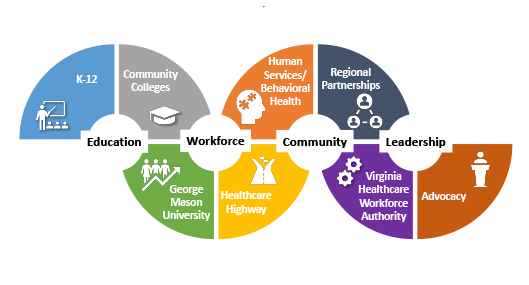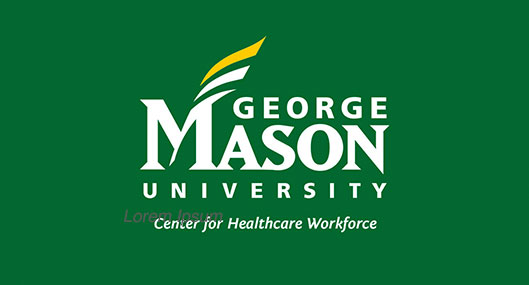GIVING
IMPACT
HUMAN SERVICES
WORKFORCE
SCHOLARS
The Claude Moore Charitable Foundation (CMCF) believes that all Virginians should have access to outstanding healthcare provided by a highly qualified professional. With critical shortages in all levels of the healthcare industry combined with an increased need in services, CMCF has taken a statewide leadership role by engaging key stakeholders from state and local government, educational institutions, and employers to build a Health Sciences Highway. To grow and nurture a healthcare workforce to meet Virginia’s current and future healthcare needs, CMCF serves as a catalyst by convening diverse stakeholders, commissioning reports on specific healthcare workforce challenges and advocating for policy and funding at the local, state, and federal level.
We believe that education should look more like a highway with on and off ramps than a straight line with a start and a finish. The foundation for the Health Science Highway is from the monumental work of the Claude Moore Scholars Program, which engages high school students in over 50 school divisions through education, connection to employers and awareness of pathways through the healthcare sector. The Health Science Highway report recognizes the need for robust pathways through all levels of education system and makes recommendations to support these pathways through resources for success, policy levers and innovation.
The Claude Moore Charitable Foundation (CMCF) understands behavioral health access and services continues to be a challenge in Virginia. In coordination with Virginia Department of Behavioral Health and Developmental Services, CMCF developed a report to provide data and information to support legislative and budget briefings for initiatives to strengthen workforce development across the Commonwealth. The key challenges included working conditions, role alignment, agency alignment, career incentives and career pathways.
Over the last two years, Virginia’s families have struggled not only with a global pandemic but with unprecedented life challenges such as food insecurity, financial loss, lack of jobs, and school closures. Layering on top the ongoing behavioral health crisis, human service professionals have played a key role providing frontline services to our most vulnerable families.
Even before the pandemic, the human services sector had record level of workforce shortages. With an increase in service demand, lack of funding, and stressful work environments, the human services field is in desperate need for more qualified professionals. Local social service departments have an average vacancy rate of 15 percent, more than double the average for other jobs in Virginia. The Commonwealth ranks 37th in the country for the number of psychologists, licensed social workers, counselors, therapists, and advanced practice nurses specializing in mental health care per population. With 61 percent of psychiatrist aged 55 and older and currently only 14 child and adolescent psychiatrist for every 100,000 children, the public and private behavioral health system’s future is in trouble.
After hearing from many human service leaders in the field, the Claude Moore Charitable Foundation took action to develop a report and strategic plan to define the common and pervasive workforce challenges and to identify the strategies needed to strengthen the human services workforce in the Commonwealth. We first convened the Human Services Workforce Leadership Advisory Group which included experts and practitioners from behavioral health, social services, juvenile justice, adult corrections and public children’s and student support services. The Advisory Group guided the research process which included interviewing over 25 leaders including Governor’s Cabinet Secretaries, collecting over 60 responses on a targeted survey and convening an in-person workshop. The feedback from multiple stakeholder groups resulted in this blueprint that will guide the executive office, elected officials, state agencies, employers and community and philanthropic support organizations in making critical decisions on funding, regulations and work climate that will increase recruitment and retention of qualified talent.
As a strong voice in workforce development, the Claude Moore Charitable Foundation (CMCF) works closely with local, state, and federal leaders, elected officials and agencies to build pathways to good jobs for all Virginians, especially under resourced. To build a case, CMCF convenes experts and practitioners through surveys, interviews, and meetings to find root causes of challenges and builds roadmaps to potential budget and legislative solutions. With current data and information, CMCF is a trusted source who advocates for funding and systemic change that supports individuals looking for training in high demand fields as well as support employers who are looking for talent. One example of CMCF’s great work is the creation of a Governor’s appointed advisor who oversees healthcare workforce development coordination, policy and budget for the state.

Claude Moore Charitable Foundation in conjunction with Deloitte have worked together to create a report making specific recommendations to address the acute shortages as well as develop a longer term strategy to maintain a focus over time.

The health services workforce highway concept encourages continuous learning, beginning with early engagement in middle school and continuing throughout with professional education. It facilitates the development of “on and off ramps” as students transition between school and work for upskilling and career change, while contributing to the economic development in local communities.

The Mason Center for Interprofessional Health Workforce Development was established to support the Claude Moore Scholars program through data collection on health workforce needs as well as supporting education and training through a learning management system. This system provides teacher support, and a variety of curricula including instruction in 21 of the 23 “career readiness skills” required in Career and Technical Education. The Center serves as a catalyst and facilitator of community action for health workforce development across Virginia by leveraging Mason’s resources and expertise to support research and community planning for workforce development.